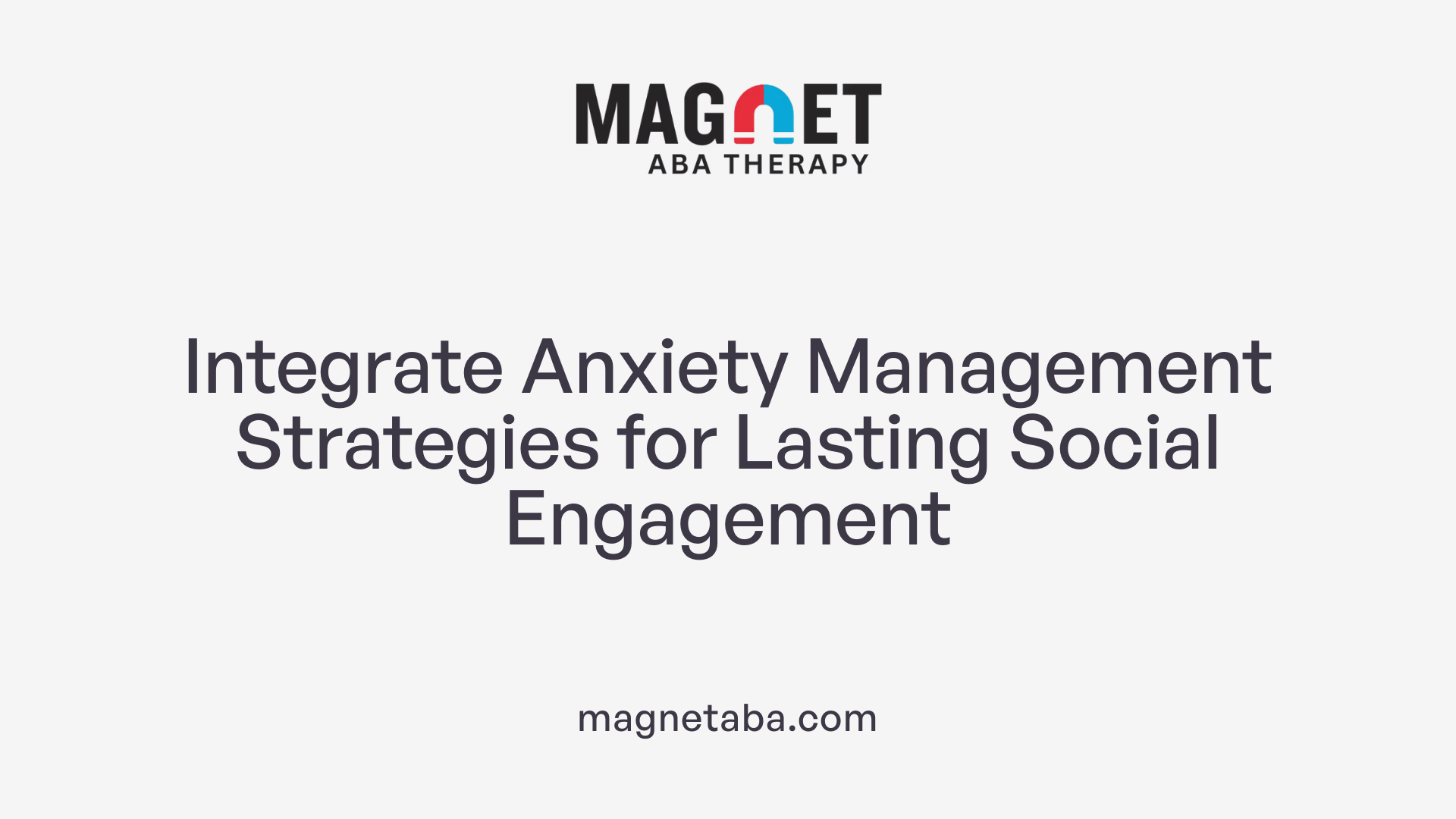Empowering Social Skills in Children with Autism through Targeted ABA Therapy
Children with autism spectrum disorder (ASD) often face significant challenges in social interactions, leading to feelings of isolation and loneliness. MagnetABA’s specialized ABA therapy programs are designed to systematically teach essential social skills, thereby helping children break barriers and form meaningful connections. This article explores how MagnetABA utilizes evidence-based techniques to reduce social isolation, improve communication, and foster lasting social development.
Foundations of ABA Therapy in Social Development
How ABA therapy helps children overcome social isolation?
ABA therapy plays a vital role in reducing social isolation among children with autism spectrum disorder (ASD). It focuses on systematically teaching crucial social skills that often pose challenges, such as making eye contact, taking turns, recognizing personal space, and understanding emotions and facial cues.
By breaking down complex social behaviors into manageable steps, therapists employ methods like role-playing exercises where children practice real-life scenarios in a safe environment. These activities enable children to recognize social cues and body language, fostering better understanding and interaction.
Positive reinforcement is another central technique in ABA. Rewards like praise, tokens, or social rewards motivate children to practice and repeat desired behaviors. This reinforcement makes social engagement more rewarding and encourages continued effort.
Group sessions also play an important part. They offer children opportunities to interact with peers, participate in collaborative play, and build friendships. Such settings help children apply their learned skills in real-world contexts, boosting confidence and reducing feelings of loneliness.
Over time, ABA therapy enhances skills like interpreting social cues and understanding emotions. When these skills are consistently practiced and reinforced in daily routines, children often experience lasting improvements in social connectedness. Ultimately, ABA therapy helps children develop more meaningful relationships and greater social participation.
Role of Techniques in Enhancing Social Skills
What techniques are used in ABA therapy to address social challenges?
ABA therapy employs a variety of methods to help children with autism develop their social skills. Among these, role-playing, social stories, modeling, and reinforcement strategies are prominently used.
One effective approach is role-playing, where children practice social scenarios in a safe environment. This helps them recognize social cues, understand different perspectives, and build confidence in real-world interactions. For example, children may practice greeting peers, sharing toys, or taking turns in a game.
In addition to role-playing, social stories and scripts are used to teach children about appropriate social behaviors. These narratives describe social situations and anticipated responses, helping children understand unspoken rules and expectations.
Reinforcement strategies play a vital role in encouraging positive social behaviors. Behavior analysts use praise, tokens, or social rewards to reinforce skills like eye contact, greeting others, or sharing. These rewards motivate children to repeat desired behaviors and help make social interactions more engaging.
Group sessions are also integral to ABA's social skills training. Led by a Behavior Analyst, these sessions facilitate peer interactions and collaborative play. They promote social bonding, turn-taking, and group problem-solving, allowing children to practice skills in a natural setting.
How do these techniques contribute to meaningful social skill development?
The combination of structured exercises and naturalistic teaching not only improves immediate social behaviors but also fosters lasting skills. Customizing strategies to each child's specific needs ensures issues like social anxiety are addressed effectively.
Overall, ABA therapy creates an environment where children can practice, receive feedback, and generalize skills across various settings. This comprehensive approach supports meaningful social connections that can last well beyond therapy sessions.
Methods and Strategies in Evidence-Based Practice

How does ABA therapy facilitate social interaction for children?
ABA (Applied Behavior Analysis) therapy promotes social skills development by systematically teaching children with autism spectrum disorder (ASD) how to interact effectively with others. It breaks down complex social behaviors into simple, manageable steps, making it easier for children to learn and practice.
One core method involves role-playing exercises, where children simulate social scenarios such as greeting someone or sharing toys. This hands-on approach helps children recognize social cues, interpret emotions, and build confidence in real-life settings.
Positive reinforcement is another crucial strategy. When children display desired social behaviors—like making eye contact or saying hello—they receive praise, tokens, or social rewards. This encouragement motivates children to repeat these behaviors, gradually expanding their social repertoire.
Group sessions also play a vital role. Led by trained Behavior Analysts, these gatherings provide opportunities for peer interaction, collaborative play, and social bonding. They help children practice social skills in a naturalistic environment and develop friendships.
ABA therapy addresses communication skills—both verbal and non-verbal—integral to social interaction. It helps children understand social cues, respond appropriately, and navigate various social settings. Personalized goals are established after assessments, with activities tailored to each child's unique needs and challenges, including social anxiety or difficulty managing emotions.
The results of ABA therapy can have lasting effects. When social skills are consistently practiced and reinforced across different environments such as home, school, and community, children often maintain and generalize these skills over time. The combination of structured teaching, positive reinforcement, and real-world application makes ABA an effective approach to enhancing social functioning in children with ASD.
Assessments and Goal Setting in ABA Therapy

What role does ABA therapy play in supporting social skills development in children with autism?
ABA (Applied Behavior Analysis) therapy is essential in helping children with autism improve their social skills. It uses individualized, evidence-based strategies to teach children how to interact socially, communicate effectively, and understand emotions. The process begins with thorough assessments to identify each child's unique strengths and difficulties.
Based on these assessments, therapists set targeted, measurable goals tailored to the child's needs. These goals focus on developing specific social behaviors such as making eye contact, taking turns in conversations, and recognizing social cues like facial expressions or tone of voice.
ABA employs a variety of teaching techniques to help children practice and master social skills. These include modeling appropriate behaviors, role-playing different social scenarios, and providing positive reinforcement when children demonstrate desired behaviors. Techniques like video modeling and social stories are also commonly used to teach children how to navigate social settings.
To ensure skills are meaningful and sustainable, ABA therapy emphasizes breaking down complex social behaviors into manageable steps— a process known as skill deconstruction. This approach allows children to learn social skills incrementally, building confidence with each success.
Furthermore, ABA strategies often involve peer-mediated interventions and natural environment training, which help children generalize their skills across different settings and interactions.
Progress tracking is a vital part of ABA therapy, with data collected regularly to monitor improvements and adjust goals as needed. This ongoing evaluation ensures that interventions remain relevant and effective, leading to lasting improvements in social competence.
Overall, ABA provides a structured, data-driven framework that not only teaches children social skills but also encourages consistent practice and reinforcement in their daily lives. This comprehensive approach promotes greater social participation, emotional understanding, and long-term success in social interactions.
Building Social Skills through Personalized Intervention Plans

How does ABA therapy help children overcome social isolation?
ABA therapy is a proven approach for helping children with autism spectrum disorder (ASD) enhance their social interaction skills. By systematically teaching essential social behaviors, it helps reduce feelings of social withdrawal and isolation.
One of the central methods involves teaching children to interpret social cues such as eye contact, body language, and facial expressions. This understanding forms the foundation for more meaningful interactions. Techniques like role-playing enable children to practice social scenarios in a safe environment, boosting their confidence and ability to handle real-life situations.
Group sessions play a vital role by providing children opportunities to interact with peers. These settings promote collaborative play and social bonding under the guidance of a trained Behavior Analyst. Positive reinforcement, such as praise, tokens, or social rewards, encourages children to engage more fully and consistently in social behaviors.
ABA therapy also focuses on addressing specific issues like social anxiety. Strategies are tailored to each child's needs, helping them manage anxiety while learning to navigate social settings. Over time, these skills become more natural, and children are better equipped to form friendships.
The learning process involves decomposition of complex social skills into manageable steps, making it easier for children to learn gradually. When these skills are reinforced and applied in daily life, the improvements tend to be lasting. Overall, ABA therapy provides children with the tools they need to connect more confidently with others, reducing feelings of loneliness and facilitating stronger social bonds.
Fostering Social Confidence and Inclusion
What are the benefits of ABA therapy for children's social development?
ABA therapy offers substantial advantages in helping children with autism develop essential social skills. Through a structured approach, it teaches children how to engage in reciprocal conversations, recognize and interpret emotional cues, understand nonverbal communication, and share interests with others.
One of the main strategies used is role-playing, where children simulate social scenarios. This practice helps them recognize social cues and build confidence in navigating real-world interactions. Positive reinforcement is also critical, rewarding desired behaviors like initiating conversations or sharing, which encourages repetition and mastery.
Group sessions further enhance social learning by allowing children to interact with peers. These sessions promote collaborative play, peer bonding, and social skill application in a supportive environment, often guided by Behavior Analysts.
ABA therapy also breaks complex social skills into manageable parts, making them easier to learn. It personalizes goals for each child, addressing issues like social anxiety or difficulties in understanding emotions. This tailored approach ensures that therapy targets specific needs, making the learning process more effective.
Improvements gained through ABA in social skills tend to be lasting, especially when children are encouraged to practice these skills regularly in daily activities. Moreover, when social skills are reinforced outside therapy, children gain confidence and become more included in their social worlds.
In addition to learning specific skills, ABA therapy fosters a sense of belonging and inclusion. It equips children to understand social norms, respect boundaries, and collaborate with peers, all of which promote meaningful social engagement. The combination of structured activities, guided practice, and reinforcement helps children build lasting confidence and participate actively in social settings.
| Skill Area | Techniques Used | Benefits |
|---|---|---|
| Communication | Role-playing, modeling, prompts | Better conversational skills, emotional understanding |
| Social Interaction | Group activities, peer play | Enhanced social bonding, cooperation |
| Emotional Skills | Recognizing emotions, understanding cues | Improved empathy, emotional regulation |
| Confidence Building | Positive reinforcement, success experiences | Increased self-esteem, social inclusion |
Overall, ABA therapy's personalized and evidence-based methods support children in acquiring vital social skills, leading to improved social confidence and greater inclusion in various settings.
Addressing Social Anxiety and Anxiety Management

How effective is ABA therapy in reducing social isolation?
Research evidence indicates that Applied Behavior Analysis (ABA) therapy is highly effective in decreasing social isolation among children with autism spectrum disorder (ASD). By focusing on enhancing social communication, peer interaction, and engagement, ABA helps children build meaningful social connections.
ABA employs various techniques such as positive reinforcement, modeling, role-playing, and naturalistic teaching strategies to teach and expand social skills. For example, through role-playing exercises, children practice real-life social scenarios, recognize cues, and gain confidence in social situations. Positive reinforcement—like praise, tokens, or social rewards—encourages repeated social behaviors, making these skills more persistent.
Group sessions are another essential component, offering opportunities for peer interaction, collaborative play, and social bonding, often led by a trained Behavior Analyst. These sessions simulate natural social environments, enabling children to generalize learned skills to everyday settings.
Multiple studies and meta-analyses support these observations, revealing that ABA leads to moderate to large improvements in socialization outcomes. Children not only develop better social skills but also transfer these skills to real-world contexts, reducing feelings of social isolation.
Moreover, ABA's comprehensive approach often enhances related skills such as language, attention, and emotional understanding, which further facilitate meaningful social interactions. Its structured assessments, personalized goals, and tailored strategies mean that each child's unique needs—such as social anxiety or difficulty managing anxiety—are addressed effectively.
Overall, evidence confirms that ABA is a robust, research-backed approach for helping children with ASD overcome social barriers, leading to more social engagement, better peer relationships, and a decrease in feelings of loneliness and isolation.
Strategies for managing social anxiety within ABA
Social anxiety can present as a barrier for many children with ASD. ABA therapy incorporates specific strategies to help manage this anxiety, including gradual exposure to social situations, social scripting, distress tolerance training, and relaxation techniques.
By systematically exposing children to various social interactions in a controlled environment, ABA aims to build confidence and reduce anxiety. Additionally, the therapy promotes understanding emotions and interpreting social cues, which can significantly diminish feelings of uncertainty and fear during social encounters.
The personalized nature of ABA allows clinicians to develop targeted interventions that address each child's particular anxieties. Over time, these strategies foster resilience and adaptability, enabling children to navigate social settings more comfortably and confidently.
When combined, these approaches contribute to lasting improvements in social functioning and emotional well-being, ensuring that gains made in therapy are maintained as children grow and encounter new social environments.
Ensuring Skill Generalization and Long-term Success

What role does ABA therapy play in supporting social skills development in children with autism?
ABA therapy is a cornerstone in helping children with autism develop vital social skills. It systematically teaches behaviors like eye contact, turn-taking, recognizing social cues, and forming friendships. The approach is personalized, relying on thorough assessments to identify each child's strengths and difficulties. This guides the creation of specific and measurable goals, ensuring that teaching is targeted and effective.
One of the core strengths of ABA is its use of evidence-based strategies that break down complex social skills into manageable steps. Techniques such as social stories, video modeling, peer-mediated interventions, and natural environment training are employed to make learning engaging and applicable to real-world settings. These methods help children practice skills in contexts similar to everyday life, promoting better retention and generalization.
ABA also emphasizes the importance of role-playing exercises where children simulate social scenarios. These activities allow kids to recognize social cues, practice appropriate responses, and build confidence. Positive reinforcement—through praise, tokens, or social rewards—encourages children to repeat desired behaviors, fostering a positive learning experience.
Group sessions led by behavior analysts further support social development. In these settings, children interact with peers through collaborative play and shared activities, which mimic natural social environments. Such interactions promote social bonding, turn-taking, and emotional understanding.
The ultimate goal of ABA therapy in this context is to enable children to interpret social cues, understand emotions, and navigate various social settings confidently. As skills are reinforced consistently and practiced regularly across different environments—home, school, community—they are more likely to become lasting. Maintaining progress involves ongoing support, parental involvement, and continued reinforcement of social skills in daily life.
In summary, ABA’s structured approach not only improves immediate social behaviors in children with autism but also supports their ability to generalize these skills outside therapy sessions. With consistent practice and reinforcement, children can develop meaningful and enduring social competence, leading to greater participation and success in social interactions over the long term.
The Critical Role of Caregiver and Peer Support in Reinforcement
What methods are employed by ABA therapy to improve social engagement in children with autism?
ABA therapy uses several effective strategies to enhance social skills among children with autism. These methods focus on both teaching new skills and reinforcing positive behaviors.
One prominent approach involves social skills training and role-playing exercises. These activities help children practice interactions in simulated scenarios, allowing them to recognize social cues, develop confidence, and understand appropriate responses.
Positive reinforcement is another cornerstone of ABA methods. When children display desired behaviors like making eye contact, initiating conversation, or taking turns, they are rewarded with praise, tokens, or social rewards. This encouragement motivates children to repeat these skills, gradually making them habitual.
In addition to individual activities, ABA incorporates peer-mediated interventions. These involve group sessions where children interact with classmates or peers, often guided by a Behavior Analyst. Group activities promote collaborative play, peer bonding, and social engagement in natural settings.
To broaden social understanding, ABA strategies include the use of social stories—narratives that depict appropriate social interactions—and modeling behaviors for children to imitate. Such tools help children grasp complex social concepts and improve their ability to interpret emotions and social cues.
Another crucial aspect of ABA is the practice of skills in real-life situations. Natural Environment Training (NET) allows children to apply what they've learned in everyday settings, which enhances the likelihood of skills generalization and long-term maintenance.
Personalized assessments and goal-setting ensure that interventions address individual needs, including issues like social anxiety or difficulty managing emotions. Tailoring strategies makes therapy more effective and meaningful.
Finally, involving caregivers through training ensures that social skills are reinforced consistently at home and in the community. When parents and teachers support targeted behaviors, children are more likely to retain and generalize their new skills.
| Method | Description | Benefits |
|---|---|---|
| Role-Playing | Simulating social scenarios for practice | Builds confidence, recognizes cues, and improves responses |
| Positive Reinforcement | Rewarding desired behaviors | Encourages repetition, motivation, and learning |
| Group Sessions | Peer interactions led by professionals | Promotes social bonding and collaborative skills |
| Social Stories | Narratives illustrating social norms | Increases understanding of social situations |
| Natural Environment Training (NET) | Real-world practice of skills | Enhances skill generalization and retention |
In summary, ABA employs diverse methods—including role-playing, reinforcement, and peer interactions—tailored to individual needs. These strategies work together to foster meaningful social engagement, which can lead to lasting improvements when supported by ongoing reinforcement at home and in daily environments. Continuous involvement of caregivers and peers plays an essential role in maintaining the gains achieved through therapy.
Fostering Long-Lasting Social Connections
Through tailored assessment, individualized goals, and dedicated practice, MagnetABA’s ABA therapy program empowers children with autism to overcome social barriers. By fostering skills such as emotional recognition, conversational reciprocity, and peer engagement, MagnetABA not only reduces feelings of social isolation but also cultivates lasting social confidence. Continuous reinforcement, caregiver involvement, and real-world application are central to ensuring these improvements are sustainable. Ultimately, MagnetABA’s approach helps children build meaningful relationships, participate fully in their communities, and lead more connected, fulfilling lives.
References
- How ABA Therapy Enhances Social Skills in Children with ASD
- Using ABA to Improve Social Skills in Children with Autism
- Concerns About ABA-Based Intervention: An Evaluation and ...
- Applied Behavior Analysis (ABA) | Autism Speaks
- The effectiveness of applied behavior analytic interventions for ...
- Effectively Teaching Social Skills in ABA
- Developing Social Skills Through ABA Therapy for Autism
- Social Skills Training in Applied Behavior Analysis? ASD












